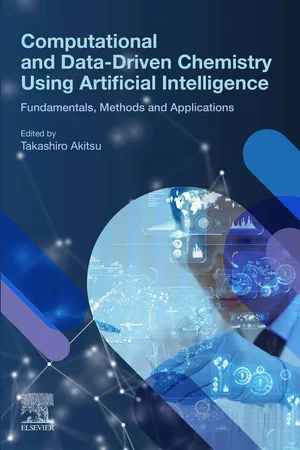
eBook - ePub
Computational and Data-Driven Chemistry Using Artificial Intelligence
Fundamentals, Methods and Applications
- 278 pages
- English
- ePUB (mobile friendly)
- Available on iOS & Android
eBook - ePub
Computational and Data-Driven Chemistry Using Artificial Intelligence
Fundamentals, Methods and Applications
About this book
Computational and Data-Driven Chemistry Using Artificial Intelligence: Volume 1: Fundamentals, Methods and Applications highlights fundamental knowledge and current developments in the field, giving readers insight into how these tools can be harnessed to enhance their own work. Offering the ability to process large or complex data-sets, compare molecular characteristics and behaviors, and help researchers design or identify new structures, Artificial Intelligence (AI) holds huge potential to revolutionize the future of chemistry. Volume 1 explores the fundamental knowledge and current methods being used to apply AI across a whole host of chemistry applications.
Drawing on the knowledge of its expert team of global contributors, the book offers fascinating insight into this rapidly developing field and serves as a great resource for all those interested in exploring the opportunities afforded by the intersection of chemistry and AI in their own work. Part 1 provides foundational information on AI in chemistry, with an introduction to the field and guidance on database usage and statistical analysis to help support newcomers to the field. Part 2 then goes on to discuss approaches currently used to address problems in broad areas such as computational and theoretical chemistry; materials, synthetic and medicinal chemistry; crystallography, analytical chemistry, and spectroscopy. Finally, potential future trends in the field are discussed.
- Provides an accessible introduction to the current state and future possibilities for AI in chemistry
- Explores how computational chemistry methods and approaches can both enhance and be enhanced by AI
- Highlights the interdisciplinary and broad applicability of AI tools across a wide range of chemistry fields
Tools to learn more effectively

Saving Books

Keyword Search

Annotating Text

Listen to it instead
Information
Table of contents
- Cover
- Front Matter
- Table of Contents
- Copyright
- Contributors
- About the editor
- Preface
- List of Illustrations
- List of Tables
- Chapter 1 : Introductory chapter
- Chapter 2 : Goal-directed generation of new molecules by AI methods
- Chapter 3 : Salen-type metal complexes based on structural database of X-ray crystallography
- Chapter 4 : Approaches using AI in medicinal chemistry
- Chapter 5 : Application of machine learning algorithms for use in material chemistry
- Chapter 6 : Predicting conformers of flexible metal complexes using deep neural network
- Chapter 7 : Predicting activity and activation factor of catalytic reactions using machine learning
- Chapter 8 : Convolutional neural networks for the design and analysis of nonfullerene acceptors
- Index
- A
Frequently asked questions
Yes, you can cancel anytime from the Subscription tab in your account settings on the Perlego website. Your subscription will stay active until the end of your current billing period. Learn how to cancel your subscription
No, books cannot be downloaded as external files, such as PDFs, for use outside of Perlego. However, you can download books within the Perlego app for offline reading on mobile or tablet. Learn how to download books offline
Perlego offers two plans: Essential and Complete
- Essential is ideal for learners and professionals who enjoy exploring a wide range of subjects. Access the Essential Library with 800,000+ trusted titles and best-sellers across business, personal growth, and the humanities. Includes unlimited reading time and Standard Read Aloud voice.
- Complete: Perfect for advanced learners and researchers needing full, unrestricted access. Unlock 1.4M+ books across hundreds of subjects, including academic and specialized titles. The Complete Plan also includes advanced features like Premium Read Aloud and Research Assistant.
We are an online textbook subscription service, where you can get access to an entire online library for less than the price of a single book per month. With over 1 million books across 990+ topics, we’ve got you covered! Learn about our mission
Look out for the read-aloud symbol on your next book to see if you can listen to it. The read-aloud tool reads text aloud for you, highlighting the text as it is being read. You can pause it, speed it up and slow it down. Learn more about Read Aloud
Yes! You can use the Perlego app on both iOS and Android devices to read anytime, anywhere — even offline. Perfect for commutes or when you’re on the go.
Please note we cannot support devices running on iOS 13 and Android 7 or earlier. Learn more about using the app
Please note we cannot support devices running on iOS 13 and Android 7 or earlier. Learn more about using the app
Yes, you can access Computational and Data-Driven Chemistry Using Artificial Intelligence by Takashiro Akitsu in PDF and/or ePUB format, as well as other popular books in Sciences physiques & Chimie physique et théorique. We have over one million books available in our catalogue for you to explore.